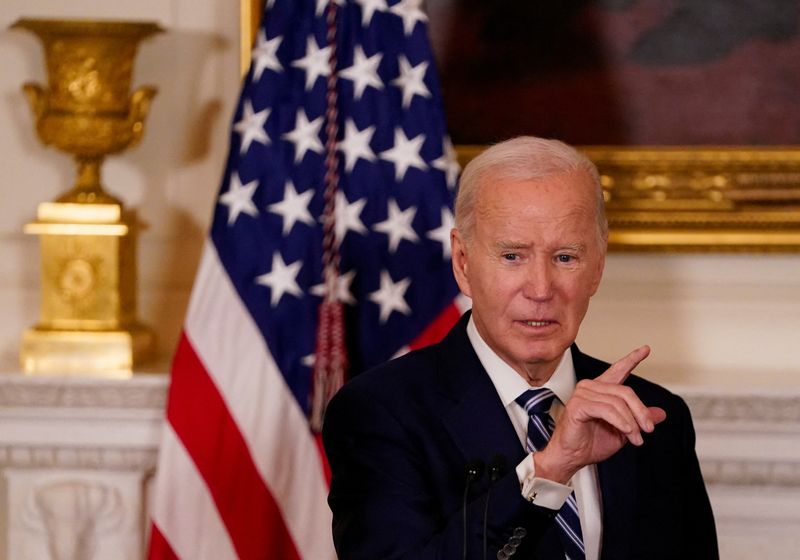By Timothy Gardner, Daphne Psaledakis, Nidhi Verma and Dmitry Zhdannikov
WASHINGTON/NEW DELHI/LONDON (Reuters) – U.S. President Joe Biden’s administration imposed its broadest package of sanctions yet on Friday, targeting Russian oil and gas revenues, in a bid to stop Kyiv and Donald Trump’s new team to provide leverage to reach a peace agreement in Ukraine.
The move is aimed at cutting Russian revenues for continuing the war in Ukraine, which has killed more than 12,300 civilians and left cities in ruins since Moscow invaded in February 2022.
Ukrainian President Volodymyr Zelenskiy said in a message on X that the measures announced Friday will deal “a significant blow” to Moscow. “The less revenue Russia gets from oil, the sooner peace will be restored,” Zelenskiy added.
Daleep Singh, a top White House economic and national security adviser, said in a statement that the measures are the “most significant sanctions yet against Russia’s energy sector, by far the largest source of revenue for (President Vladimir) Putin’s war.” .
The US Treasury Department has imposed sanctions on Gazprom (MCX:) Neft and Surgutneftegas, which explore, produce and sell oil, as well as on 183 ships that have shipped Russian oil, many of which are part of the so-called shadow fleet of aging tankers that are being operated by non-Western companies. The sanctions also include networks that trade the oil.
Many of those tankers have been used to ship oil to India and China as a price ceiling imposed by the Group of Seven countries in 2022 has shifted Russian oil trade from Europe to Asia. Some tankers have shipped both Russian and Iranian oil.
The Treasury Department also revoked a provision that would have exempted energy payment mediation from sanctions against Russian banks.
The sanctions should cost Russia billions of dollars a month if they are sufficiently enforced, another U.S. official told reporters in a phone call.
“There is no step in the production and distribution chain that remains untouched and that gives us more confidence that evasion will become even more expensive for Russia,” the official said.
Gazprom Neft said the sanctions were unjustified and illegal and would remain in place.
The US is ‘no longer constrained’ by tight oil supplies
The measures allow a wind-down period until March 12 for sanctioned entities to complete energy transactions.
Still, Russian oil trade and Indian refining sources say the sanctions will cause serious disruption to Russian oil exports to key buyers India and China.
Global oil prices rose more than 3% before the Treasury Department’s announcement, to nearly $80 a barrel, as sanctions documents circulated among traders in Europe and Asia.
Geoffrey Pyatt, the U.S. assistant secretary for energy resources at the State Department, said new volumes of oil are expected to come online this year from the U.S., Guyana, Canada and Brazil and possibly from the Middle East to make up for lost oil. volumes will be replenished. Russian offer.
“We no longer see ourselves as constrained by the tight supply in global markets as we were when the price cap mechanism was unveiled,” Pyatt told Reuters.
The sanctions are part of a broader effort as the Biden administration has provided Ukraine with $64 billion in military aid since the invasion, including $500 million this week for air defense missiles and fighter jet support equipment.
Friday’s measure followed U.S. sanctions in November on banks including Gazprombank, Russia’s largest conduit to the global energy sector, and earlier last year on dozens of tankers carrying Russian oil.
The Biden administration believes that November’s sanctions helped push the Russian ruble to its weakest level since the invasion began and prompted Russia’s central bank to raise its key interest rate to a record level of more than 20%.
“We expect our direct targeting of the energy sector will exacerbate pressure on the Russian economy, which has already pushed inflation to nearly 10%, and reinforce the bleak economic outlook for 2025 and beyond,” one of the officials said.
REVERSAL WOULD IMPLEMENT CONGRESS
One of the Biden officials said it was “entirely” up to President-elect Trump, a Republican, who takes office on Jan. 20, when and under what conditions he could lift sanctions imposed during the Biden era.
But to do that he would have to notify Congress and give it the opportunity to cast an adverse vote, he said. Many Republican members of Congress had urged Biden to impose Friday’s sanctions.
“Trump’s people can’t just come in and quietly undo everything Biden just did. Congress should be involved,” said Jeremy Paner, a partner at law firm Hughes Hubbard & Reed.
Trump’s return has raised hopes for a diplomatic solution to end Moscow’s invasion, but also fears in Kiev that a quick peace could come at a high price for Ukraine.
Trump’s advisers have put forward proposals that would effectively cede large parts of Ukraine to Russia in the near future.

Trump’s transition team did not immediately respond to a request for comment on the new sanctions.
The military aid and oil sanctions “give the next administration a significant boost to their and Ukraine’s influence in achieving a just and lasting peace,” one of the officials said.


